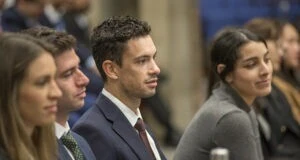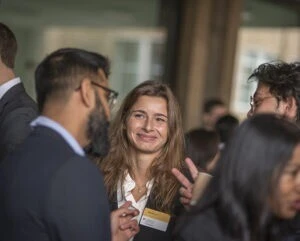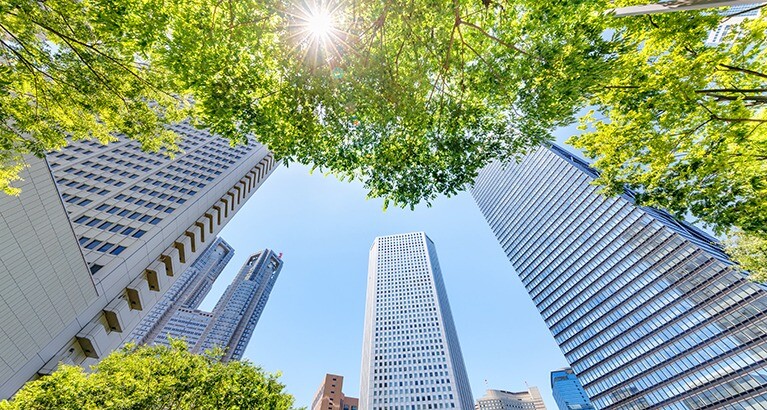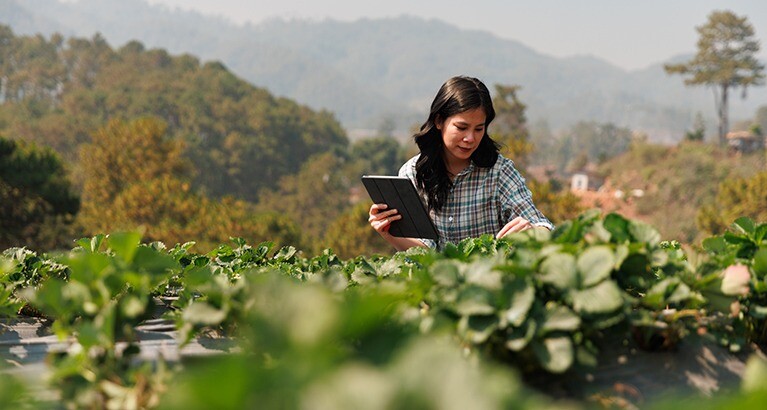The Cambridge MBA Sustainability pathway
We believe that sustainability is an essential part of business strategies and processes.
Through our MBA, we seek to educate the next generation of global leaders to pursue careers that contribute to a sustainable future in business, government, non-profit, and international organisations. Cambridge is uniquely positioned to do this, with a large set of academics across the School and University engaged on these topics, and our global business connections.
The Cambridge MBA programme is designed to equip you with the knowledge and skills you need to address sustainability issues in your business career.
We offer several opportunities for you to not only learn about sustainability and apply what you learn in real-life situations, but also learn alongside a diverse set of individuals from across sectors and geographies – a feature useful in progressing sustainability objectives in business.
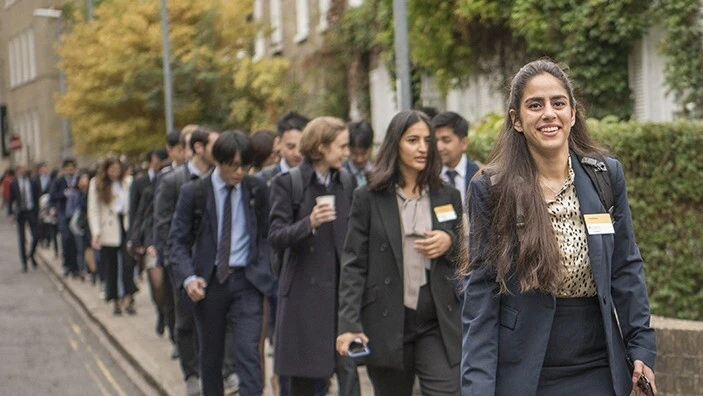
The Cambridge MBA programme is designed to equip you with the knowledge and skills you need to address sustainability issues in your business career.
Curriculum elements
We have designed a specialist pathway through the MBA curriculum to enable you to build knowledge and skills across the sustainability, from elective courses to projects and career development.
Concentrations
Our Concentrations offer you the opportunity either to expand your skillset and explore new industries, or gain greater depth in a specific area of interest. They run in the second and third terms, and are run by by specialist coaches, who may be a member of our academic faculty or an external business professional, with particular expertise in the given field.
In the Easter term, MBA students can select a Concentration:
This Concentration is designed to provide our students with a comprehensive understanding of sustainable business practices.
Students will learn about sustainable business strategies, supply chain management, the UN Sustainable Development Goals, and stakeholder engagement.
The impact of climate change is far wider than energy supply and demand response. Our built environment has an enormous impact on our carbon footprint and climate has profound impacts on the agricultural sector. Managers need to understand how these changing international, geopolitical, sectoral and consumer dynamics are likely to change the business environment creating threats and opportunities for them.
The pervasive nature of energy and environment across the economy and within firms means that it serves as a wonderful case study across all aspects of business education: marketing, strategy, economics, finance, operations, ethics and leadership.
Sustainability pathway electives
You can also choose Sustainability Pathway Electives. These electives provide you with the opportunity to deepen your knowledge in specific areas of sustainability. You can choose from a wide range of electives, including:
In this course we will explore how to think strategically about sustainability. Strategies and tools for managing sustainability include those that help us think systematically about impacts, draw meaningful comparisons, and assess opportunities for change within a business’ own operations, its supply chain, and with partners. We will also consider the myriad pressures on business and how leading organisations are setting meaningful targets and aligning their sustainability actions with frameworks like the UN Sustainable Development Goals (SDGs), Science Based Targets, etc. The course is structured around learning, practicing with, and critically evaluating key tools for managing sustainability issues strategically and through the lens of different aspects of business management (for example: operations, supply chain, innovation, risk, change management). Specific tools include: systems thinking, life cycle assessment, and circular economy. We use cases, in-class exercises, and role plays.
This course is designed to provide an overview of the operation of markets for energy and emissions within their public policy context. The course will cover the interactions between different energy and emissions markets, finite natural resources, energy market reforms, regulated energy networks and support mechanisms for low carbon investments. It will necessarily pay attention to recent turmoil in European energy markets. The course will, necessarily, pay particular attention to electricity markets as these are where issues of energy and climate change come together. The aim will be to combine an understanding of public policy drivers, markets and business opportunities in the energy and environment area.
The challenge of humanity’s response to climate change is in part being driven by innovation—both by large players, particularly those in the principal greenhouse gas (GHG) emitting sectors of energy, mobility, buildings, agriculture and food, and manufacturing, and by entrepreneurial players focused both on decarbonisation and on carbon removal. Regulator-, legal- and investor-driven pressures are converging as drivers for incremental and would-be-breakthrough innovations. Some entrepreneurs are seeking to provide intellectual property for the coming ‘net zero revolution’, some are trying to create new value chain nodes, some are trying to disrupt industries and some are seeking to create new strategic architectures. Meanwhile, corporates, in a way analogous to the relationship between financial services and fintech startups, are turning to the startup world for solutions to their own Net Zero journey. This course will explore how climate tech entrepreneurship is taking flight and explore emergent trends in the space. Particular attention will be given to how climate tech entrepreneurship is ‘different’ to previous waves of entrepreneur-driven innovation.
The module will appeal to those who would like to develop their abilities to think strategically in the field of energy and climate change, for example to understand both the threats and opportunities that global energy security and climate change present to their personal lives, and the fortunes of the sectors and organisations they work for (or would like to work for).
This course aim to describe, understand and discuss current developments and trends in the area of sustainable finance, with a special focus on climate risk and ESG (environmental, social and governance).
With the help of expert guest speakers, we shall look to distinguish between different types of sustainable finance products and relevant eligibility criteria. The course looks at how various ESG scoring and assessment approaches have been applied to real life case studies. It also explores how sustainable finance is evolving in emerging markets.
Careers with impact
Many of our students have made sustainability a key part of their careers with impact. They work for organisations ranging from global corporates to startups, all of them trying to solve sustainability challenges.
Equipping MBA graduates for rewarding careers in sustainability & ESG
In light of COP28, we explore the MBA curriculum pathway for careers in sustainability and ESG. Professor Matthew Grimes from Cambridge Judge Business School, along with MBA alumni, discuss the leadership skills needed to succeed and make a lasting impact on the planet.
MBA sustainability career and student experience insights
From the prestigious Annual Energy Conference hosted together with the Cambridge University Energy Network to the Energy and Environment Special Interest Groups, we take a look at the student MBA experience, as well as the career insights from across our MBA cohort.
Sustainability career outcomes
From renewable energy in Africa to E-mobility in Europe, discover how our MBA alumni transitioned their career across the ESG and sustainability sector.
Hear from Rishika Daryanani
My name is rishika darianani. I’m originally from California and I now live in London. I found my job at McKinsey during my MBA year through the careers team and through structured consulting recruiting for the MBA. When I came into the MBA I came from Accenture Consulting and was thinking about what the right next move might be and through the MBA I rediscovered my love of Consulting. Through the different projects that we were able to do.
I wanted to transition my career to more climate focus which I’m able to do at McKinsey which is really exciting. Consulting provides a variety of paths and career options so when I came in I knew I kind of wanted to be more climate focused, but I didn’t know exactly how and what and the consulting path has really allowed me to explore.
During my MBA year I was able to specialise and concentrate in the energy and environment concentration and then I was also able to focus my project work in the ESG and climate space. So my GCP project was at Inditex and I was an MBA consultant structuring and thinking through into Texas carbon pricing strategy to be able to help them decarbonise themselves in their supply chains.
I was able to attend COP27 as part of an internship I had at the end of my MBA in that fourth term. I interned for the UNF Triple C and then I was able to go to COP27 to help support some of the international negotiations.
My MBA education absolutely helped me think about it from more of a rounded out perspective so you know the parts of international negotiations are very kind of political or they’re very kind of policy based but also thinking about it from a business and economics perspective really helped add some light and colour to the conversation.
I had my job at McKinsey secured early in my MBA career so I was trying to figure out how to add some dimension to the to my resume into my education and I wanted to do that in the public sector space and so I very intentionally kind of focused on applying to internships or project opportunities that would help round out some of that education from a business perspective in the social sector.
I found my position at the UN based on a larger initiative at Cambridge called the Climate Change Society. The courses is part of the Cambridge MBA that have impacted me kind of most personally I think were the courses I took through my Concentration and energy in the environment I was able to really deeply understand energy markets I had one-on-one faculty tuition which was awesome and got to interact with leaders in the sector.
Professionally I think what supported me most is my strategy class as well as kind of thinking through the role of the CEO which was one of the electives that was offered in our last term. I was able to switch location which was really important to me to be able to get more of a global person.
Rishika Daryanani from both the UK and USA, chose the Energy and Environment Concentration and tailored her MBA Electives and her Summer Work Placement, as well as her MBA Global Consulting Project, to shape and focus her MBA year within the sustainability consulting sector and to pivot her career.
Hear from Bryden Smallwood
Prior to the Cambridge MBA, I spent the majority of my career in infrastructure investment fund based out of Canada, mostly doing commercial due diligence forecasts in the energy and transport space. My background is in engineering and I was working in a very finance-focused company. And as I was looking at different opportunities and kind of where I wanted to go next, I felt like I needed more or I wanted more options around where I could take my career. And I felt like an MBA was a good opportunity to kind of build those business fundamentals that I didn’t get through engineering and that I felt like I wasn’t fully learning on the job.
I was looking into the clean energy sustainability space just because the kind of stage of the energy transition is a lot further along in Europe than it is in North America. And that really led me to Cambridge and I knew there was a significant focus on energy. I kind of wanted to focus a little bit more on the corporate strategy or consulting aspect of clean energy sustainability. So a lot of my elective choices were either strategy or sustainability or clean energy. So on the concentration side, so I went for the energy and environment concentration. It was a really cool opportunity to kind of use my learnings throughout the year and apply them critically to what they’re presenting and seeing what do I think about this business. And it was a really interesting opportunity, but also allowed me to leverage my existing knowledge that I’d built throughout the year.
Both my GCP and the CVP were in the climate space. My CVP was with a startup out of Cambridge. I was looking at kind of decarbonizing the home, and then our GCP was a fair amount different. So we worked with Deloitte Ventures and basically we were putting together a research report on ESG transformations within the financial services industry. So it was an interesting problem for us to solve because we were operating kind of inside, but external of this massive organisation. And how do we think about this problem. But think about it through the lens of Deloitte?
So going forward in my career post-MBA, looking to stay in the clean energy sustainability space. Coming out of the MBA, I still feel really good about my decision to come. I think as an investment, I think education is generally a good investment. And I do think having been in the MBA, not just the academics, but meeting all these different people from all over the world and all of them with different experiences and different work lives, I feel like has given me a better view of where things are and where I can sit. I also think it’s helped with my own confidence around what type of roles I could see myself being in in the future. I also think it’s an experience you can’t really get elsewhere. And I think all of that taken together will definitely make it a good investment. And I think even beyond that, just Cambridge itself, I think there’s a lot of value in just being within this ecosystem just because of how special of a place it is.
Bryden Smallwood from Canada, had a background in engineering but was looking for different opportunities and where to go next in his career. Looking at the clean energy sustainability space led him beyond North America and to Cambridge, where there is a significant focus on energy. He became the President of the Cambridge University Energy Network and organised the Annual Conference during his MBA year.
Areas of expertise
Insight from our areas of expertise.
Biodiversity finance is moving from a specialist sustainable‑finance topic to a core concern for investors, companies and policymakers. A new Special Issue of the Review of Finance on biodiversity and natural resource finance brings this emerging field into focus. Explore its main messages and takeaways from the key papers included.
AI and technology
Why AI’s role in the circular economy is deeply contested
Circularity may be popular with citizens, but when it comes to artificial intelligence, it becomes deeply divisive. Research co-authored by Shahzad Ansari of Cambridge Judge develops a framework to help find common ground based on purpose, strategy and governance regarding AI and circularity outcomes. The framework shows that debate about AI and circularity revolves around 3 questions: what AI is for, how circularity should be pursued and who gets to decide.
News
Top 10 reads of 2025
Articles about artificial intelligence and sustainability were among the most popular stories on the Cambridge Judge Business School website in 2025, reflecting a year in which AI capabilities expanded apace and the November COP30 climate-change summit in Brazil focused attention on the environment.
Research centre news
New UN report cites Cambridge Judge sustainability research
Four studies co-authored at the El-Erian Institute of Behavioural Economics and Policy at Cambridge Judge Business School are cited in a new United Nations report on the global environment. The report – entitled the Global Environmental Outlook, 7th edition: A Future We Choose – cites the El-Erian research in an extensive chapter on food systems.
ESG and sustainability
Healthy proportions: animal-sourced food and the plant-based shift
Shifting to affordable plant-rich, low-waste diets can save millions, halve food emissions and restore nature for a healthier future across the globe.
Social impact
Climate conflict: can tech make peace?
There has been a proliferation of technological tools aimed at spotting and stopping climate and conflict risks around the world, yet such tools have to be handled carefully to prevent oversimplification and the exclusion of different viewpoints, says research from the Cambridge Peaceshaping and Climate Lab at the Cambridge Centre for Social Innovation (CCSI).
Financial Times | 16 April 2024
Business school teaching case study: can green hydrogen’s potential be realised?
There are still a lot of hurdles to overcome before green hydrogen can really help in reducing carbon emissions. This quick teaching case study from Professor Jennifer Howard-Grenville of Cambridge Judge Business School and Ujjwal Pandey explores the issues.


